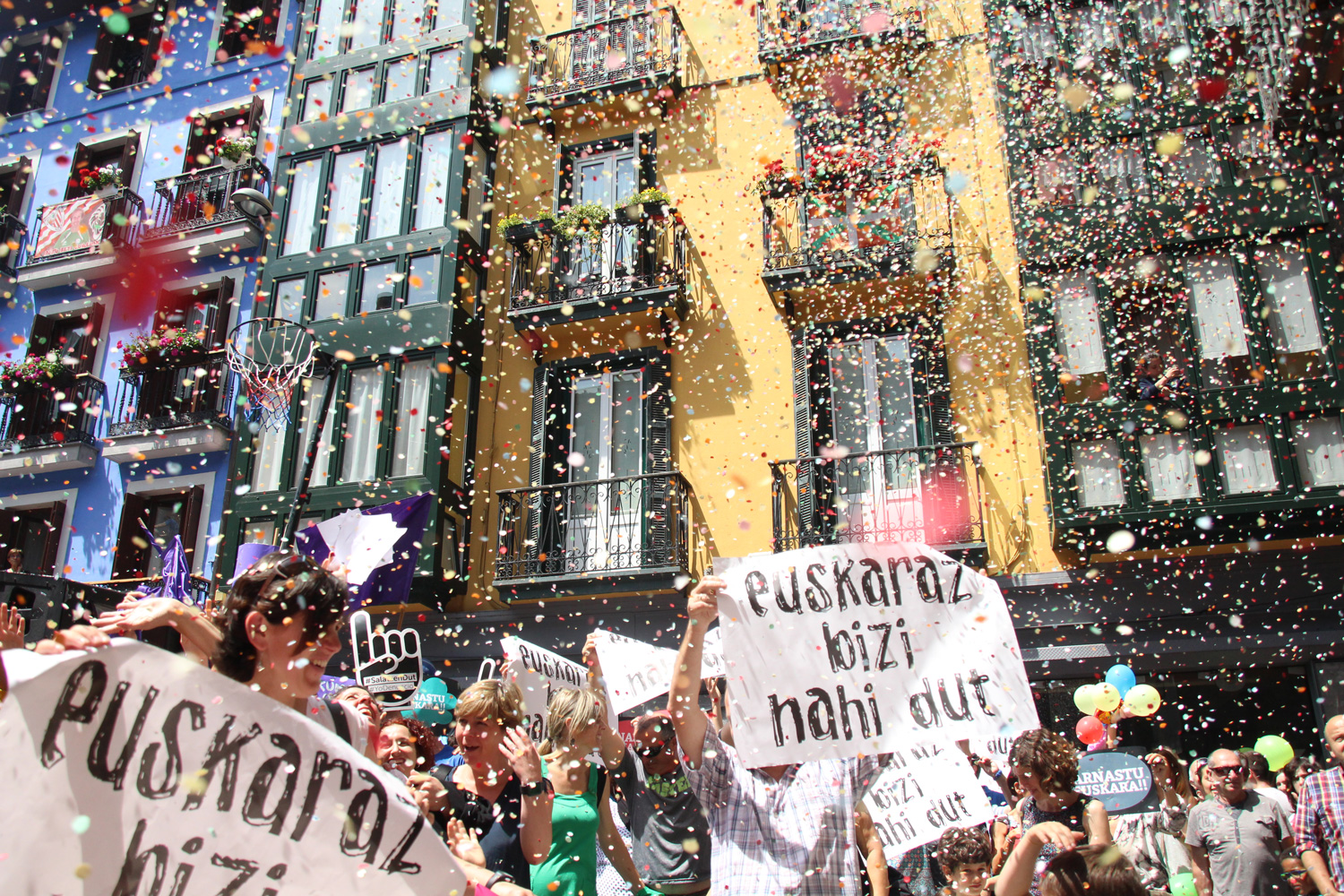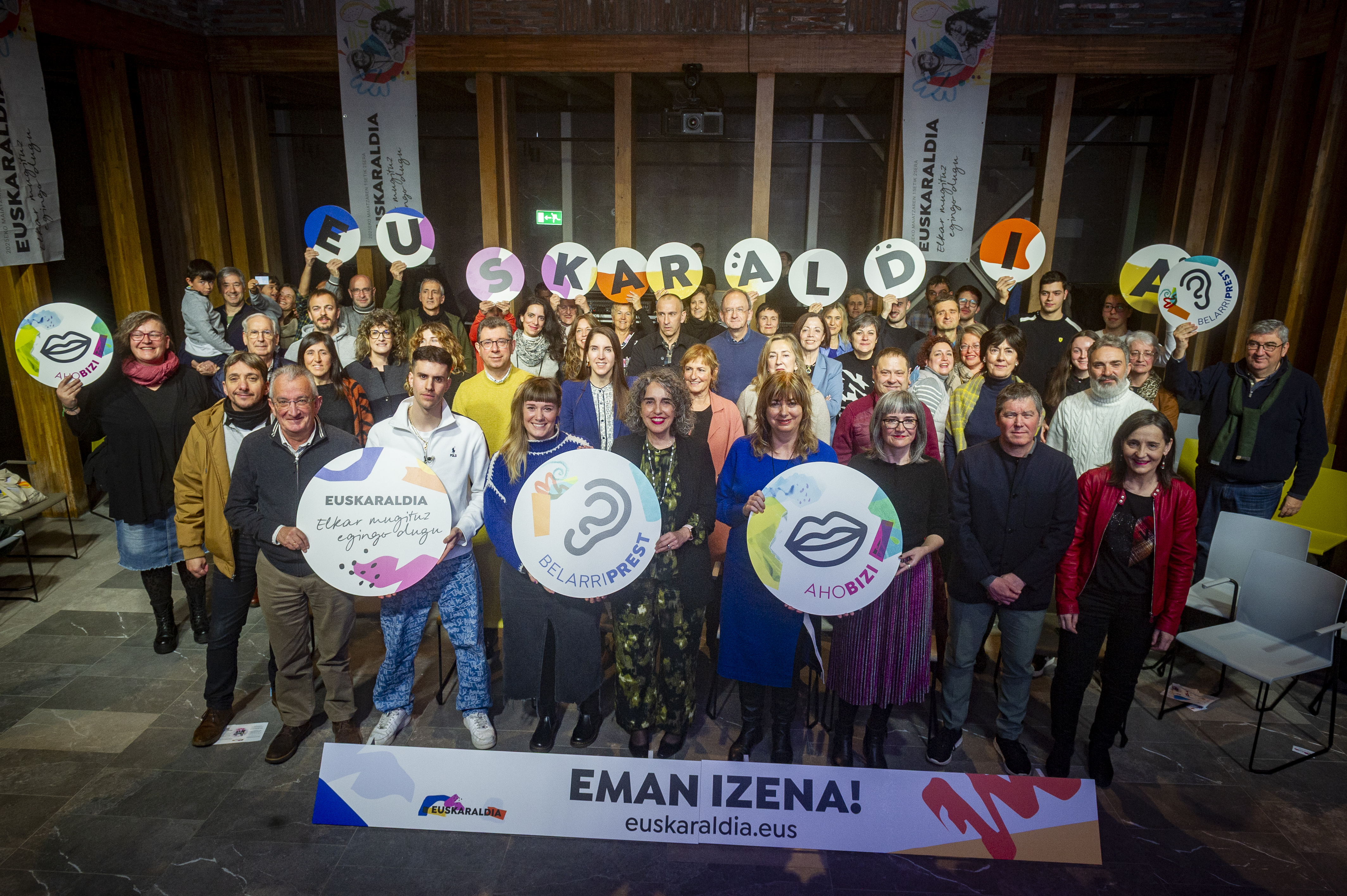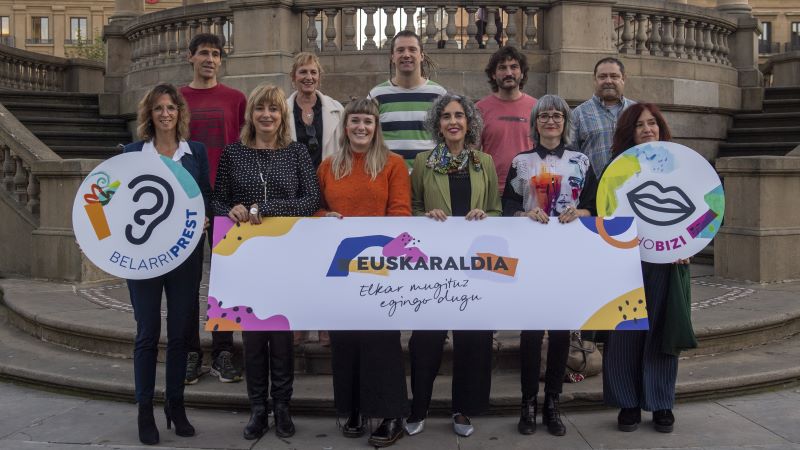The key is empowerment.
- In times of drought, we Euskaltzales have taken Euskaraldia as rain. Were the popular movements in favor of the Basque Country on the desert journey, quite concerned about money and the activist, trying to guess what to do to make a qualitative leap?

The first drops came in 2014, bringing to the Basque the feminist perspective the purple glasses gave. The reading that asserts the need to make visible the oppression suffers by the mere fact of being Basque and empowering oneself to face it opened horizons. In March 2015, Korrika extended the concept of Euskaldunen throughout the Basque Country. In July of that same year, the writer Lutxo Egia spent 30 days in Bilbao speaking in Basque and reported his experiences in the blog Transitoak de Berria. When he announced the experiment, he mentioned the readings learned from feminism, especially the need to make “a conscious and political choice” as a Basque. In early 2016, the psycholinguistic exercise at the collective level was carried out for the first time in the Donostia district of Egia, and in autumn it was carried out in other localities: Hernani, Lasarte-Oria and Salvatierra, each with a different approach.
When, after so many years, the institutions have not normalized, is it consistent that they themselves work to set in motion the key to the fight for the Basque Country in the activation of citizenship?
With this background, and with the commitment to the Lasarte-Oria model – where the figures that separate ahobizi and belarriprest were invented –, Euskaraldia has been held mainly in collaboration between Topagunea and the Basque Government, although later more promoters have been incorporated. The fact that a public institution takes the lead role in the most powerful annual initiative of the Basque cultural movement has not given rise to controversy. However, the questions come by themselves: when after so many years the institutions have not normalized, is it consistent that from Lakua and even the municipalities, they themselves set in motion the key of the fight for the Basque in the activation of citizenship? Should not the Basque Government simply support the initiative? And if we share leadership, why not share responsibilities, activating citizenship by popular movements and undertaking concrete and courageous commitments by public institutions? During those eleven days, for example, you will be able to start taking another place for the Basque in ETB2, to try, to continue taking bigger steps next year.
The marketing, the economic resources and the speed with which the whole of the Basque Country is forced to carry out this same year have made the initial rain current. Many peoples and agents have seen the issue of language as an opportunity to make it visible collectively; in other peoples and agents, the doubts have been greater – either because of the approach, or because of the difficulties of reconciling it with the work being carried out in the people – although, in the end, the need to be there has been imposed, in general, cannot be ruled out.
Also in Basque those who do not have plates
The wave of Euskaraldia is on top. Spread massively and in a single year, it risks becoming an accession campaign for the Basque people at the head of many. However, from these first experiences, this is not the basis of the exercise: it is about empowering.
The key for the Euskaltzales will remain the same during these eleven days, taking advantage of the fact that the national resonance has been achieved: to implement the empowerment learned from feminism, to maintain the option of living in Euskera in all situations, regardless of whether or not the previous one has been a belarriprest veneer. Transgressing the path of freedom at the local level, without complexes. This exercise has a lot of disobedience. Asking in Basque in a bar of Erdaldun atmosphere and keeping the Basque in conversation is not disobeying social norms? That is why they have organized TELP workshops in many villages, to empower Euskaldunes and to train how to keep the Basque without losing their smile in the face of language clashes, as the need is great.
The map of the Basque country that ARGIA distributed last year announces that you can do it in Basque with more people than you expect. Even the biggest marketing campaign would not be able to plague all those who understand Euskera in the Basque Country today. The people are already much more Euskaldun than the image we have in our heads. The key, therefore, whether or not to carry the veneer, be empowered and speak in Basque everywhere, beyond the first words.
.jpg)
There will be no lack of institutions, associations, companies, citizens who take the picture for the Basque people in Euskaraldia and who, as always, will continue to function in Spanish. It's the price of the desire to make massive in the short term.
In addition, it should be noted that, with the exception of the exceptions, it has not been clearly communicated what drownings have to do with people who do not carry any veneer after the first word, so this campaign has been understood as everyone wants. Have we not sought to avoid uncomfortable situations, but to make uncomfortable situations visible and manage them? The droplets at the starting point of this flood were not belarriprest, but the empowerment of the Basques, who proposed to them how to act also with the Castellanospeakers who do not wear plates. When and why are references to feminism, empowerment, the importance of the long-term process blurred, shocks in everyday life?
Swimming at the time of the wave
We Euskaltzales enjoy the festival, those who for so many years and suffering what we have suffered, we have decided to live in Euskera, the activists. To have a favorable environment on the street, to connect the Basque country with positive elements, to give visibility to the Basque Country is always a pleasure. Will it not then be the thousands of drownings that have so far been registered by the Basque people? What is more, how many of them are involved in many other areas of the construction of a country?
But the most important thing is what can leave room: groups of Euskaltzales that have been created or reinforced in the villages, networks of relationships, shared experiences...
The wave, which has caused the fine and serious work of thousands of people, will go after eleven days. But the most important thing is what can leave room: groups of Euskaltzales that have been created or reinforced in the villages, networks of relationships, shared experiences...
The citizens will do their part, but the time has come for the institutions to take responsibility too. In the presentation of the initiative, the Basque Government pointed out that 2019 will be the year of the institutions (see on this link, page 8, point 4). Adopt measures to facilitate “new social practices in each organisation”. From the education system, through Osakidetza or the free teaching of language, to the Basque language as a working language of the administration, there are tasks. That the empowered Euskaldunes reinforced by Euskaraldia be people to people, guarantee that the institutions comply with their part of the commitment.
Euskaraldiaren hamaikakoa aurkeztu dute Nafarroan: Julio Soto bertsolaria, Edurne Pena aktorea, Julen Goldarazena musikaria (Flakofonki), Claudia Rodriguez Goxuan Saltsan taldeko abeslaria, Eneko Garcia (Albina Stardust), Yasmine Khris Maansri itzultzaile eta kazetaria,... [+]
Gasteizen egin duten ekitaldian ireki dute izen ematea, laugarren edizioa hasteko bi hilabete falta direla. Erakundeetako ordezkariak, herritarrak eta entitateetako kideak agertu dira, besteak beste. Euskaraldiaren koordinazioa Euskal Herriko erakunde publikoen eta Taupa... [+]
Hamahiru ZirHika kide batu dira hitanoaren erabilera aldarrikatzeko eta antolakundearen ekintzen berri emateko. Azalpenak Badihardugu elkarteko Idoia Etxeberria eta Galtzaundiko Uxoa Elustondok egin dituzte. Horiei, Andoni Egaña eta Amaia Agirre bertsolariak eta... [+]
Euskaraldia comes back. Apparently, it will be in the spring of next year. They have already presented it and the truth is that it has surprised me; not Euskaraldia himself, but his motto: We'll do it by moving around.
The first time I have read or heard it, the title of the... [+]
The Basque country is about to finish writing these lines, the end is still insufficient. They will certainly be beautiful, similar to those of a great party.
In Bizkitarte I have carefully read, here or in other publications, lines written by people more expert than I, let us... [+]
On November 18, the “Euskaraldia” began, an initiative that aims to promote the use of Euskera among Basque speakers and non-Basque speakers for two weeks. Although I believe that this initiative has shortcomings in some contexts and there is no better veneer than “Good... [+]




















